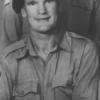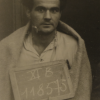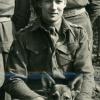On D Day in Normandy I took part in the first full scale British Airborne Divisional Operation. Our D.Z. (Drop Zone) was near the village of Ranville. I dropped some 10 miles inland and rejoined 7th Para Bn six days later.
There has always been a reluctance to give an account of this time. According to army records I went 'missing' which contributed little to the war effort and 7th Para Bn's D.Day objectives. I can only describe my experience as a scared animal desperate to rejoin the herd. As time went on it all seemed a bad dream, best forgotten.
Recently it seems to be more acceptable for ex-service people to recount their war experiences. Having obtained details of records held, the period I went missing was from 6th June to 14th June 1944. The aircraft I was travelling in, a Stirling four engined bomber, was damaged by enemy fire but returned safely to base. Unlike two other Stirlings, one carrying part of the Mortar Platoon, crashed near La Deliverande killing all on board, the second carrying special forces crashed near Grangues. The few survivors were captured, taken to a nearby Chateau, occupied by an S.S. unit, and shot, their bodies dumped in a nearby pit. The Irish Governess, employed at the Chateau, took on the task of their burial, carried out secretly, at night.
All told 40 aircraft carrying 720 Paras flew this dangerous mission to deliver our Battalion to drop on Normandy soil. They flew over the enemy coast at a height below 1000 feet, attacked by enemy night fighters and anti-aircraft fire. Once again we have the Royal Air Force to thank.
By the end of May 1944 following months of intensive training 7th Para Bn moved to a tented concentration area secured within a barbed wire fence. With all leave cancelled, access and exit from the camp tightly controlled we were informed 'Operation Overlord' the invasion into Europe was due to take place. Much time was spent in the heavily guarded Briefing Room where we learned the tasks 7th Para Bn, had been set. With the aid of aerial photographs, models and maps all the fine details were explained and our battle orders given.
The evening of the 5th June saw us being loaded into Bedford Q.L. trucks, to travel through the heart of the Gloucestershire countryside passing villages on our way to Fairford Airfield. Our loose change was thrown to the village children who had gathered to cheer us on our way. They collected the coins in buckets and pans with their parents looking on subdued for they had guessed our mission.
Our journey was broken when the Battalion formed up at a disused Transit Camp for our Padre Rev E M Parry to conduct his last open air service. Next day, attending the wounded at our Regimental Aid Post at Benouville he was killed.
At the airfield we were introduced to the air crew, offloaded our weapons and equipment to learn we would be enplaning around 10 p.m. The time came to draw our parachutes, and as they were fitted we realised beyond any doubt that this was not just another exercise, this was for real. Adjustments were made to equipment and faces blackened, and then it was my turn to enplane. I was helped aboard for I carried extra weight with a kit bag of mortar bombs attached to my leg to be released and lowered on a rope as I came down. It was uncomfortable sitting on the floor in two rows facing each other.
I recall very little of the flight south and over the English channel, apart from the sweet tea passed down in white china mugs which finished up in a broken heap to our rear; the sound of a radio intercom and then the command 'Red Light On'. The plane throttling back, then the 'Green light on'. I struggled to rise. The plane pitched and rolled. This was unusual, every second delay added to the length of the 'stick' on the ground. Somehow I reached the aperture in the floor at the tail end, dropped without 'ringing the bell', managed to release my leg attachment and almost immediately landed in an apple tree. I released my chute. No injury other than a bruised left thigh (still remains part 'frozen' to the touch). The bag of mortar bombs had split, my Sten gun seemed o.k. and also my Mae-West which was carried in the event of the bridges over the Caen canal and River Orne being blown. 7th Para Bn objective was to defend these bridges and to form a bridgehead at all costs, and they did just that, and I quote General R.N. Gale Commander of 6th Airborne Division:-
"This ended a great day for the 7th Parachute Battalion. They fulfilled their task. They had held the West bridgehead and had twenty one hours continuous and hard fighting. The men were tired but well satisfied and proud of their achievements. Casualties had amounted to sixty killed and wounded".
It had turned midnight as I set off hopefully in a northerly direction, the gate out of the orchard led into a deep set lane bounded by the bocage, banks each side with hedge and trees on top, a formidable barrier and ambush. This lane led to a single track railway which I crossed later, and in the distance I could distinguish buildings. As I started to investigate a lorry drove in and turned right and figures dismounted- Germans. How they did not see me I will never know. I retreated and took the decision to keep off the roads if possible and keep to the fields and woods. Progress was slow in the dark, small fields and gateways not easily located. In one corner I found a pond covered in duckweed. I was thirsty and moving the duckweed I filled my water bottle, it's stopper had dislodged, inserted the blue purification tablets to dissolve and took a welcome drink.
At some time during these early hours tiredness began to take over and I sought a concealed resting place. On waking it was daylight and I could hear heavy firing which I assumed was the seaborne assault. I felt guilty, because sleeping on duty was a serious offence. I continued my march eventually leading to a well worn road bearing signs of tank tracks. As I made for the open country I heard the sound of approaching vehicles and took immediate cover to witness two track vehicles loaded with troops.
Following farm tracks, but giving farms a wide berth, dogs and livestock could be a nuisance, I observed a farmer on a stool milking a cow in a field. I altered direction passing behind him. I could see a road in the distance, some buildings and a tower. I made for the gate when firing started. I knew I was in trouble. It was an old fashioned iron gate and as I clambered over there was an explosive sound. I had activated the cylinder to inflate my mae-west and I was being strangled. I could hear bullets striking the hedge. I ripped the mae-west by plunging my fighting knife in its side, ran down the road, found a gap and made my get away, checked if I was being followed before taking cover. Looking back I saw the tower and assumed this was the source of the firing. It was about this time that I decided to rest up and travel by night. I recall spending a day in a wood close to some houses which I discovered were in use by some Germans.
By now I had lost track of time and days and decided to risk an early start again for I had exhausted my emergency rations. A road, once again, was very nearly rny undoing. As I crossed, a vehicle similar to our Jeep came into view. Was it ours? Then I saw their helmets-Germans! I fired my Sten gun which jammed. I ran down the road towards a bend looking for a gap. I literally bashed my way through losing part of my equipment in the process and set off across the fields. I was followed, I ran, crawled, changed direction and looking back from behind cover noticed they had drifted to the left. I kept going until I collapsed and crawled into the bottom of a ditch. As I recovered I checked to see if all was clear and headed towards a wooded area, desperate for a drink I found a muddy pool.
As I approached the edge I was surrounded, a gun to my back. The French resistance had arrived. They thought I was a German in my camouflaged para smock. I persuaded them otherwise. I was taken to a farm, given a welcome drink and food and eventually went with a guide to 8th Para Bn's forward position on the edge of Bois de Bavent where Lt. Col. Pearson debriefed me. I was given instructions on how to locate 7th Para Bn, to complete my journey.
I fought on front line in 'A' Company 7th Battalion ( L.I.) The Parachute Regiment for the rest of the campaign and was withdrawn from Pont Audemer 5th Sep 1944
6th Airborne Division Total Casualties 4457 Killed 821
7th Para Bn. Total Casualties 452 Killed 90
Acknowledgements
(1) My thanks to Captain N.M. Archdale who served with 7th Para. Bn. fought in all campaigns-Normandy ;Ardennes; The Rhine; India; Malaya/Java and Palestine A great help when I was Hon. Secretary of our Association- a friend and adviser.
(2) A serving member of 3 Para. Sgt M L Fisher who encouraged me to write this account and lives in the next village- a good friend.
By R.A.Lycett (Tony)
Read More




Latest Comments
There are currently no comments for this content.
Add Comment
In order to add comments you must be registered with ParaData.
If you are currently a ParaData member please login.
If you are not currently a ParaData member but wish to get involved please register.